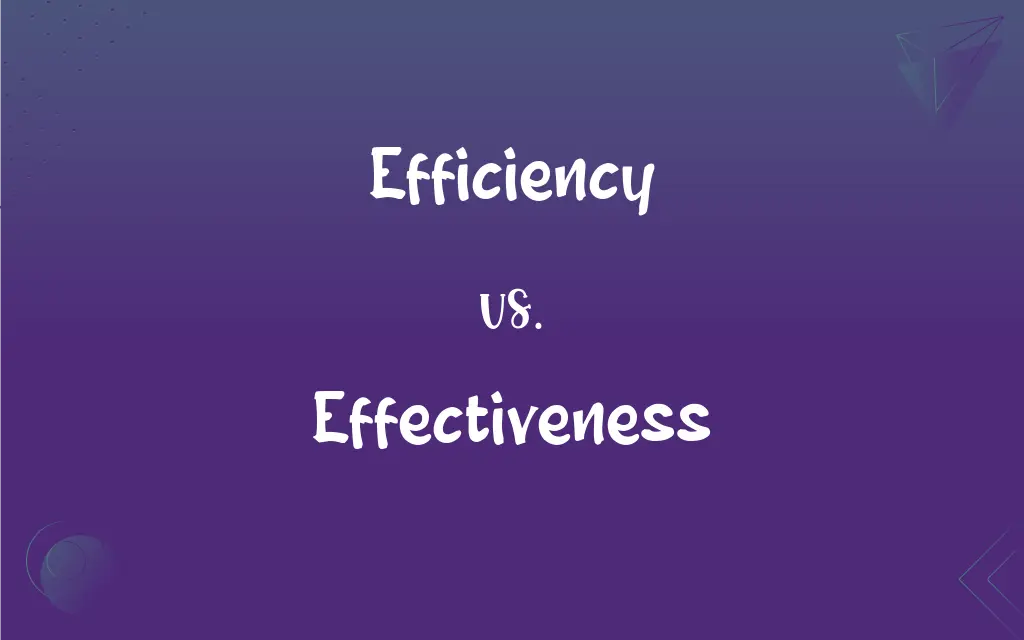Efficiency vs. Effectiveness: What's the Difference?
Edited by Aimie Carlson || By Harlon Moss || Updated on October 19, 2023
Efficiency refers to doing things in the most resource-saving manner, while effectiveness is about achieving the intended result.

Key Differences
Efficiency and effectiveness are two concepts often used in various fields, from business to everyday life. While efficiency is about maximizing output with the least input, effectiveness is about accomplishing a goal or producing the desired outcome.
In organizational settings, efficiency often relates to the optimal use of resources like time, money, and manpower. Effectiveness, on the other hand, focuses on achieving objectives or desired outcomes without necessarily emphasizing resource utilization.
From a process perspective, an efficient system may reduce waste and save resources, but it doesn't necessarily mean it's effective. Conversely, an effective system achieves its goals, even if it requires more resources to do so.
It's vital to strike a balance between efficiency and effectiveness. Being efficient but not effective can lead to wasted resources without achieving goals. Meanwhile, being effective without efficiency can achieve results but might be resource-intensive or costly.
To summarize, efficiency emphasizes the "how" of doing things - the method or process, while effectiveness revolves around the "what" - the result or outcome of an action.
ADVERTISEMENT
Comparison Chart
Primary Focus
Resource utilization
Achieving desired outcomes
Measurement
Ratio of output to input
Degree to which objectives are met
In Organizational Context
Cost-saving, time management
Goal accomplishment, results-driven
In Everyday Usage
Doing tasks with minimal waste
Doing the right tasks to achieve a goal
Associated Phrase
"Doing things right"
"Doing the right things"
ADVERTISEMENT
Efficiency and Effectiveness Definitions
Efficiency
Achieving maximum productivity with minimum wasted effort.
With proper training, the team's efficiency greatly improved.
Effectiveness
The degree to which something achieves its intended purpose.
The effectiveness of the new marketing strategy boosted sales.
Efficiency
Minimizing waste in processes.
Streamlining operations increased the company's efficiency.
Effectiveness
The capability of producing a desired outcome.
Evaluating the effectiveness of the program is crucial before expansion.
Efficiency
The ratio of output produced to input used.
The new machine's efficiency has reduced production costs.
Effectiveness
Success in producing a desired result.
The medicine's effectiveness varies among individuals.
Efficiency
Optimal use of resources to achieve a goal.
Solar panels can increase a home's energy efficiency.
Effectiveness
Aptitude in accomplishing tasks or goals.
The effectiveness of the software reduced manual workload.
Efficiency
The capability of producing desired results without wasted energy or effort.
The car's fuel efficiency makes it economical for long drives.
Effectiveness
Meeting objectives or expectations.
His leadership effectiveness was evident in the team's accomplishments.
Efficiency
The quality or property of being efficient.
Effectiveness
Having an intended or expected effect.
Efficiency
The degree to which this quality is exercised
The program was implemented with great efficiency and speed.
FAQs
Can a system be effective without being efficient?
Yes, a system might achieve its goals (effective) but use excessive resources (inefficient).
Is it possible for something to be efficient but not effective?
Yes, a process can be resource-saving (efficient) but may not achieve its intended goal (effective).
Is effectiveness more qualitative than efficiency?
Often, yes. Effectiveness relates to meeting objectives, which can be qualitative, while efficiency is typically quantitative.
In business, is it more important to be efficient or effective?
Both are important; efficiency saves resources while effectiveness ensures goals are met. Balance is key.
Is there a trade-off between efficiency and effectiveness?
Sometimes. In striving for efficiency, one might compromise on effectiveness, and vice versa.
How can one measure efficiency?
Efficiency can be measured as a ratio of outputs to inputs, often expressed as a percentage.
Can improving efficiency lead to increased effectiveness?
Not always. Being more resource-saving doesn't guarantee better goal achievement.
Are there benchmarks for efficiency and effectiveness?
Yes, industries often have standards or benchmarks to measure and compare both.
Do efficiency and effectiveness apply only to business contexts?
No, they can be applied in various fields and everyday scenarios, from personal tasks to broader societal goals.
Can tools or technologies improve both efficiency and effectiveness?
Yes, the right tools can enhance resource utilization and goal achievement.
Is cost-effectiveness the same as effectiveness?
Not exactly. Cost-effectiveness considers both outcomes and resource use, while effectiveness focuses on outcomes alone.
Can a highly efficient system ever become ineffective over time?
Yes, if conditions or objectives change, even the most efficient systems might no longer meet their goals.
Are efficiency and effectiveness mutually exclusive?
No, something can be both efficient and effective simultaneously.
In what context are efficiency and effectiveness most commonly discussed?
Often in business, management, and organizational settings, but they're applicable in various fields.
Why is it challenging to be both efficient and effective?
Because maximizing resource-saving can sometimes diverge from the path to achieving desired outcomes.
Is efficiency always about saving money?
No, it can also refer to saving time, reducing waste, or optimizing other resources.
How do companies balance efficiency and effectiveness?
Through strategic planning, regular evaluation, and adjusting processes based on feedback.
Does effectiveness always guarantee success?
Effectiveness means meeting objectives, which is a form of success, but other factors can influence overall success.
Can a person be trained to be more efficient or effective?
Yes, with proper training, guidance, and practice, improvements in both areas are possible.
Which is more short-term, efficiency or effectiveness?
Efficiency often has a more immediate, short-term focus, while effectiveness can be both short and long-term.
About Author
Written by
Harlon MossHarlon is a seasoned quality moderator and accomplished content writer for Difference Wiki. An alumnus of the prestigious University of California, he earned his degree in Computer Science. Leveraging his academic background, Harlon brings a meticulous and informed perspective to his work, ensuring content accuracy and excellence.
Edited by
Aimie CarlsonAimie Carlson, holding a master's degree in English literature, is a fervent English language enthusiast. She lends her writing talents to Difference Wiki, a prominent website that specializes in comparisons, offering readers insightful analyses that both captivate and inform.































































